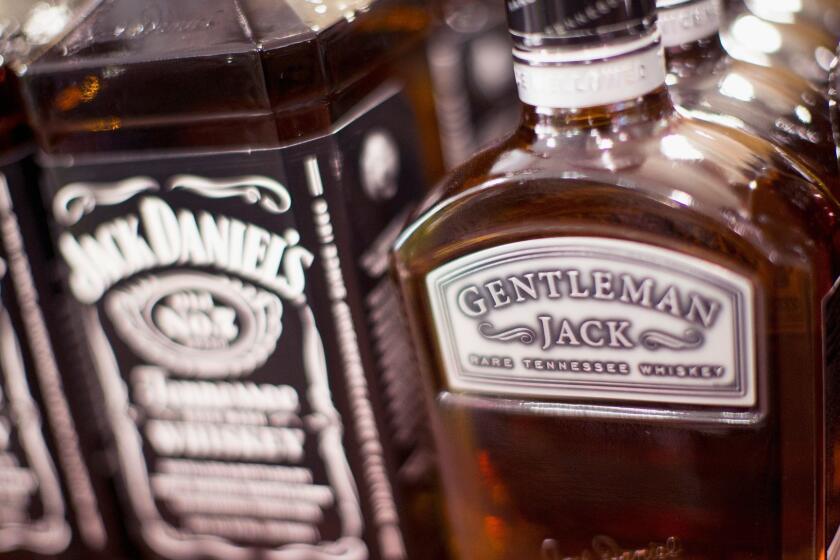Scotch whiskey distilleries rush to beat Trump’s tariffs with an airlift
- Share via
Distilleries have taken to flying their whiskey across the Atlantic in a rush to get bottles into the U.S. before President Trump’s trade tariffs take effect.
Scotch usually arrives in the U.S. by sea since its weight makes air freight too costly. There is normally no need to hurry as there is with fresh produce such as salmon, another of Scotland’s big exports. But 25% tariffs, which are due to be imposed Friday (barring any last-minute U-turn), have prompted some producers to take to the skies.
They include Kilchoman, a distillery on the famous whiskey-producing island of Islay. Anthony Wills, Kilchoman’s founder, sent about 3,000 bottles by airplane this month.
“We’ve just air freighted a shipment to get there just prior to the deadline,” Wills said. He estimated the expense of air freighting was probably double that of shipping, adding about 10% to the overall costs. But this would still be cheaper than the looming tariffs.
California wineries were expanding into China’s big wine market. Trump’s trade war is destroying their plans.
Single malts have emerged as a big loser from Washington’s tit-for-tat trade dispute with the EU. The Trump administration this month received approval from the World Trade Organization to slap levies on $7.5-billion worth of EU goods annually in retaliation for Brussels’ aircraft subsidies.
Italian cheese, French wine and Spanish olive oil are also to be subjected to the tariffs. Among U.K. products, whiskey is the biggest target. On average, more than four bottles per second were exported last year to the U.S., the industry’s largest and most valuable market, according to the Scotch Whisky Assn.
Although blended Scotch is exempt, single malts accounted for about $443 million worth, or about a third, of exports into the U.S. last year, according to the SWA. Bourbon and other American whiskey imports into Europe were hit in a previous round of EU tariffs.
Getting Scotch from the distillery to the shelf in the U.S. takes about four weeks by sea. Scotland lacks deep-sea facilities, so it is typically transported first by rail to ports in England.
Ahead of the tariffs, several other distilleries had been “running the numbers” on air freight and some had found it was “working in their favor,” said another person close to the industry.
“Shipping by air is expensive, but it might make sense to do that for higher-end stuff,” said Chris Rogers, at trade specialist Panjiva.
Small U.S. bourbon producers are finding that European drinkers love their products.
Although the scale of the whiskey airlift could not be established, industry data show that producers have also been accelerating sea shipments. Whiskey amounting to about 1,300 20-foot cargo containers arrived arrived in the U.S. in September, according to figures from Panjiva, about a quarter more than the previous month and a fifth more than in the same period last year.
Diageo, whose single malts include Lagavulin, Talisker and Glenkinchie, accounted for almost a third of U.S.-bound sea shipments in the past year. It was followed by Glenlivet-owner Pernod Ricard and then Bacardi, whose brands include Craigellachie and Aberfeldy. All three companies also have interests in blended whiskey.
Industry lobbyists have warned of a detrimental impact of the tariffs on the Scottish economy. The Scotch whiskey industry directly employs about 11,000 people in Scotland, according to the SWA.
© The Financial Times Ltd. 2019. All Rights Reserved. FT and Financial Times are trademarks of the Financial Times Ltd. Not to be redistributed, copied or modified in any way.
More to Read
Inside the business of entertainment
The Wide Shot brings you news, analysis and insights on everything from streaming wars to production — and what it all means for the future.
You may occasionally receive promotional content from the Los Angeles Times.











